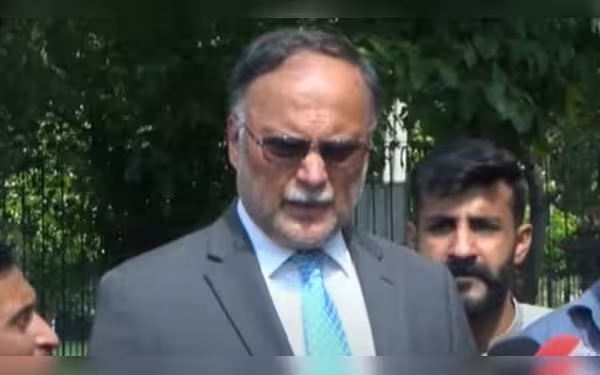Thursday, November 7, 2024 03:30 AM
Ahsan Iqbal: No Dialogue with PTI Until Imran Khan Apologizes
- Ahsan Iqbal demands Imran Khan's apology for May 9 events.
- PTI accused of causing more harm than terrorists.
- PML-N prioritizes energy crisis resolution and governance reforms.
 Image Credits: thefrontierpost
Image Credits: thefrontierpostAhsan Iqbal states no talks with PTI until Imran Khan apologizes for May 9 events, highlighting ongoing political tensions in Pakistan.
In a significant political development, Federal Minister for Planning and Development Ahsan Iqbal has firmly stated that there will be no dialogue with the Pakistan Tehreek-e-Insaf (PTI) until its founder, Imran Khan, offers an apology for the events that transpired on May 9. This statement underscores the ongoing tensions between the ruling party and the opposition, highlighting the deep divisions within Pakistan's political landscape.
Ahsan Iqbal did not hold back in his criticism of the PTI, asserting that the party has inflicted more harm on the nation than terrorists. He raised a crucial question: how can meaningful discussions occur with individuals who have allegedly caused such damage? The minister's remarks reflect a broader sentiment among the ruling party, which is increasingly wary of engaging with the PTI under the current circumstances.
Moreover, Iqbal condemned the PTI's approach, particularly their demand for 'receipts' from their political opponents, which he views as an unreasonable expectation in the current political climate. He emphasized that Pakistan is facing an undeclared war, with various enemies attempting to destabilize the country through acts of terrorism and internal strife.
In a related context, Prime Minister Shehbaz Sharif has been actively meeting with other political leaders, including Jamiat Ulema-e-Islam (JUI-F) chief Fazlur Rehman. Iqbal noted that the Prime Minister intends to engage with a broader spectrum of political figures to foster dialogue and address pressing national issues.
During a recent meeting of the Pakistan Muslim League-Nawaz (PML-N), rising electricity prices emerged as a critical topic. The party leadership underscored the urgency of resolving the energy crisis to alleviate the burden on the public. Iqbal also reiterated that the local government system remains a key component of the party's manifesto, indicating a commitment to governance reforms.
In a separate but related statement, Khawaja Asif, a senior leader of the PML-N, expressed his opposition to any talks with the PTI. Speaking to reporters outside the party's Model Town secretariat, Asif categorically denied being part of any committee aimed at facilitating dialogue with the PTI through other political alliances. When questioned about Imran Khan's future, he remarked that he is not a soothsayer and cannot predict anyone's fate.
Meanwhile, Special Assistant to the Prime Minister on Political Affairs, Rana Sanaullah, has accused anti-state forces of being directly involved in the violence in Balochistan. He vowed that these elements would be dealt with firmly, emphasizing the government's commitment to maintaining law and order. During a visit to condole the death of a prominent political figure, Sanaullah reiterated that those responsible for creating chaos in Balochistan would face serious consequences.
As the political landscape in Pakistan continues to evolve, the call for accountability and dialogue remains a pressing issue. The refusal to engage with the PTI until an apology is issued reflects the deep-seated animosities that characterize current political relations. Moving forward, it will be crucial for all parties involved to find common ground and prioritize the nation's stability over political rivalries. Only through constructive dialogue can Pakistan hope to navigate its challenges and foster a more unified political environment.













